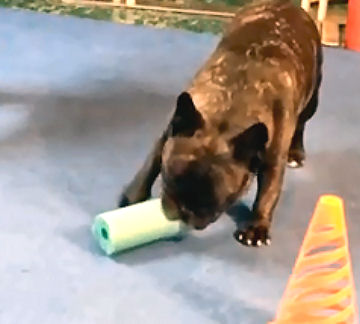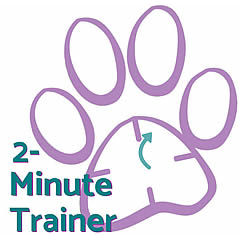Setting priorities in dog training
When your dog does something unexpected in a training session, how do you react? Do you remember your priorities in dog training? Or do you allow your focus to wander?

Torque gave Hope a lesson in keeping priorities straight. In the middle of their 2-Minute Trainer video of the week, he decided to take off with the training game’s object, carry it off to a corner, and shred it to bits.
So she screamed “NO!” at him, wrestled it out of his mouth, smacked him with it, and crated him immediately.
Of course not. You can see in the video that she takes a pause to figure out what Torque’s up to. Removes the toy, and attempts to regain his attention and focus. It’s semi-successful, but calls for a change in the plan.
There are two paths forward:
- Change directions and teach Torque to use pool noodle pieces, not eat them.
- Use something else for the “Push!” game and get on with life.
Decide what’s important
Is it worth it for Torque to learn not to eat pool noodles? When we think about how often he’ll encounter them, not really. If we used them for anything but dog training games, it might be important. But we have no pool, and he’s never going anywhere without us. The chances of him encountering and destroying other people’s pool noodles in the wild is minimal. So we’re going to make a different choice for his training games.
That’s how you keep your eyes on the prize. Torque showed us the object we were using for the game isn’t a viable option. So we’ll use something else. That’s keeping your dog training priorities in order. We talked about training certain behaviors regardless of the public’s perception of any breed’s intelligence some time ago.
Be ready to shift gears
“Shifting gears” used to be something every driver had to know how to do. Nowadays, most people probably don’t even know the origin of the phrase. But it’s still a good one. Drivers of manual transmission cars had to pay attention to multiple inputs (speed, traffic, signals, etc.) and be ready to literally shift gears to adjust. Constantly.
Dog training requires that you’re paying attention to what your dog is telling you and be ready to shift gears and adjust. Torque’s theft of the pool noodle was him saying “I don’t know what you want, so I’m leaving.” His repetition of that means “Shredding this thingie is highly rewarding to me, so I’m going to keep doing it.”
Given a choice, dogs will always opt for the most rewarding action. At that moment, shredding the noodle was more rewarding than playing with Hope. Gears have to shift. The game has to get more fun, and the object less so.
Always communicating
Your dog is always providing feedback on your training. If you pay attention to what their behavior and body language tells you, your partnership will thrive.
And be ready to shift on the fly (back to car references!). If, instead of a pool noodle, Torque had suddenly decided that books are wonderful to destroy, we would have to address that. If it matters to you, you can make it matter to your dog. You set your own priorities in dog training.






